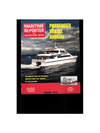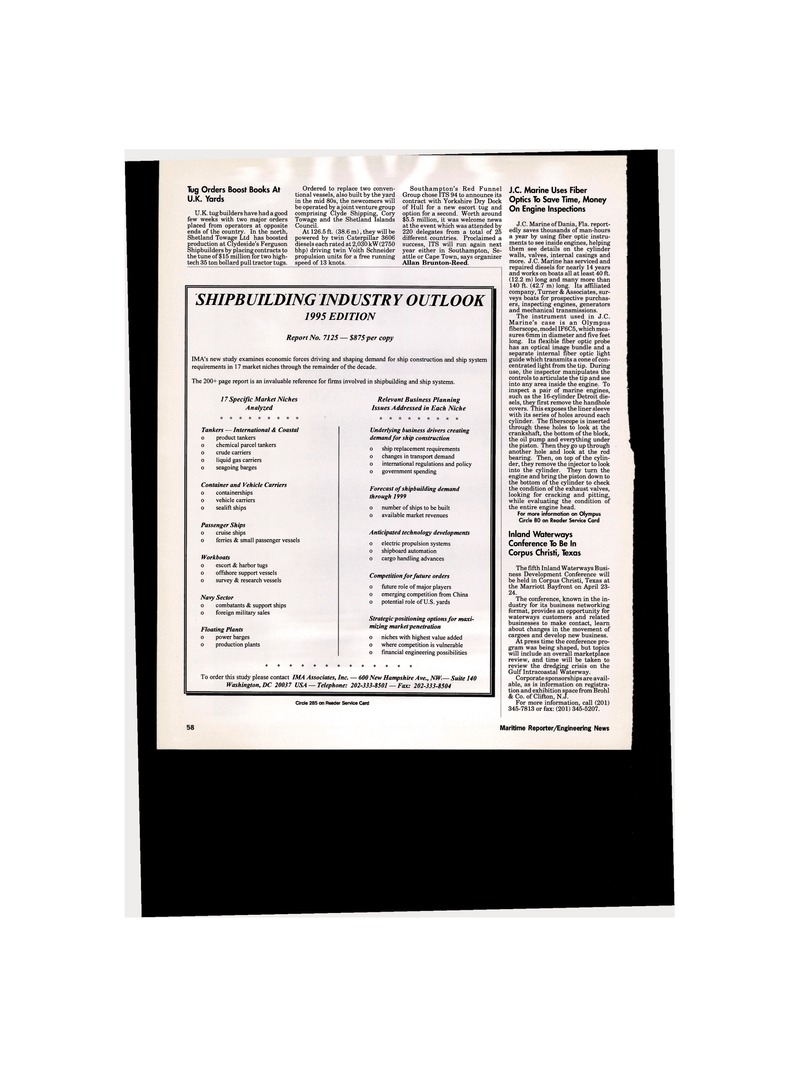
Page 64: of Maritime Reporter Magazine (January 1995)
Read this page in Pdf, Flash or Html5 edition of January 1995 Maritime Reporter Magazine
Tug Orders Boost Books At
U.K. Yards
U.K. tug builders have had a good few weeks with two major orders placed from operators at opposite ends of the country. In the north,
Shetland Towage Ltd has boosted production at Clydeside's Ferguson
Shipbuilders by placing contracts to the tune of $15 million for two high- tech 35 ton bollard pull tractor tugs.
Ordered to replace two conven- tional vessels, also built by the yard in the mid 80s, the newcomers will be operated by a joint venture group comprising Clyde Shipping, Cory
Towage and the Shetland Islands
Council.
At 126.5 ft. (38.6 m), they will be powered by twin Caterpillar 3606 diesels each rated at 2,030 kW (2750 bhp) driving twin Voith Schneider propulsion units for a free running speed of 13 knots.
Southampton's Red Funnel
Group chose ITS 94 to announce its contract with Yorkshire Dry Dock of Hull for a new escort tug and option for a second. Worth around $5.5 million, it was welcome news at the event which was attended by 220 delegates from a total of 25 different countries. Proclaimed a success, ITS will run again next year either in Southampton, Se- attle or Cape Town, says organizer
Allan Brunton-Reed.
SHIPBUILDING INDUSTRY OUTLOOK 1995 EDITION
Report No. 7125 — $875per copy
IMA's new study examines economic forces driving and shaping demand for ship construction and ship system requirements in 17 market niches through the remainder of the decade.
The 200+ page report is an invaluable reference for firms involved in shipbuilding and ship systems. 17 Specific Market Niches
Analyzed
Tankers — International & Coastal o product tankers o chemical parcel tankers o crude carriers o liquid gas carriers o seagoing barges
Container and Vehicle Carriers o containerships o vehicle carriers o sealift ships
Passenger Ships o cruise ships o ferries & small passenger vessels
Workboats o escort & harbor tugs o offshore support vessels o survey & research vessels
Navy Sector o combatants & support ships o foreign military sales
Floating Plants o power barges o production plants
Relevant Business Planning
Issues Addressed in Each Niche
Underlying business drivers creating demand for ship construction o ship replacement requirements o changes in transport demand o international regulations and policy o government spending
Forecast of shipbuilding demand through 1999 o number of ships to be built o available market revenues
Anticipated technology developments o electric propulsion systems o shipboard automation o cargo handling advances
Competition for future orders o future role of major players o emerging competition from China o potential role of U.S. yards
Strategic positioning options for maxi- mizing market penetration o niches with highest value added o where competition is vulnerable o financial engineering possibilities
To order this study please contact IMA Associates, Inc. — 600 New Hampshire Ave., NW—Suite 140
Washington, DC 20037 USA — Telephone: 202-333-8501 — Fax: 202-333-8504
Circle 285 on Reader Service Card
J.C. Marine Uses Fiber
Optics To Save Time, Money
On Engine Inspections
J.C. Marine of Dania, Fla. report- edly saves thousands of man-hours a year by using fiber optic instru- ments to see inside engines, helping them see details on the cylinder walls, valves, internal casings and more. J.C. Marine has serviced and repaired diesels for nearly 14 years and works on boats all at least 40 ft. (12.2 m) long and many more than 140 ft. (42.7 m) long. Its affiliated company, Turner & Associates, sur- veys boats for prospective purchas- ers, inspecting engines, generators and mechanical transmissions.
The instrument used in J.C.
Marine's case is an Olympus fiberscope, model IF6C5, which mea- sures 6mm in diameter and five feet long. Its flexible fiber optic probe has an optical image bundle and a separate internal fiber optic light guide which transmits a cone of con- centrated light from the tip. During use, the inspector manipulates the controls to articulate the tip and see into any area inside the engine. To inspect a pair of marine engines, such as the 16-cylinder Detroit die- sels, they first remove the handhole covers. This exposes the liner sleeve with its series of holes around each cylinder. The fiberscope is inserted through these holes to look at the crankshaft, the bottom of the block, the oil pump and everything under the piston. Then they go up through another hole and look at the rod bearing. Then, on top of the cylin- der, they remove the injector to look into the cylinder. They turn the engine and bring the piston down to the bottom of the cylinder to check the condition of the exhaust valves, looking for cracking and pitting, while evaluating the condition of the entire engine head.
For more information on Olympus
Circle 80 on Reader Service Card
Inland Waterways
Conference To Be In
Corpus Christi, Texas
The fifth Inland Waterways Busi- ness Development Conference will be held in Corpus Christi, Texas at the Marriott Bayfront on April 23- 24.
The conference, known in the in- dustry for its business networking format, provides an opportunity for waterways customers and related businesses to make contact, learn about changes in the movement of cargoes and develop new business.
At press time the conference pro- gram was being shaped, but topics will include an overall marketplace review, and time will be taken to review the dredging crisis on the
Gulf Intracoastal Waterway.
Corporate sponsorships are avail- able, as is information on registra- tion and exhibition space from Brohl & Co. of Clifton, N.J.
For more information, call (201) 345-7813 or fax: (201) 345-5207. 66 Maritime Reporter/Engineering News

 63
63

 65
65
